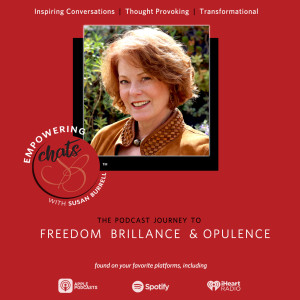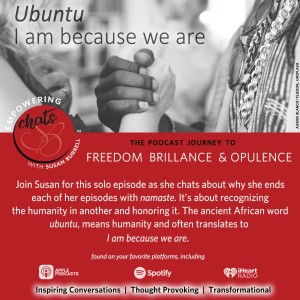
Empowering Chats with Susan Burrell
Education:Self-Improvement

Ep #200 - Ubuntu - I Am Because We Are - A Solo Episode with host Susan Burrell
In this solo episode which launches the month of September I am choosing to focus on Namaste and the Humanity that we all share. Many of you who listen to my show know that I end each show with the phrase “Namaste.” The definition of Namaste is, “I bow to you.” I was also taught that it means, “The humanity in me bows to the humanity in you.” And as I was contemplating this show and the meaning behind the word, Namaste, I pulled out some of my notes on Ghandi. The saying, “I bow to you,” is a Hindu saying and came to me when I began to explore Ghandi’s life. This saying, “I bow to you” started to come into common use in the 1940s.
And as I reviewed my notes on Ghandi and the book I have about his life, I also came across an essay by Archbishop Desmond Tutu that appears at the beginning of my Ghandi book.
This particular essay, which again is written by Desmond Tutu speaks to this phrase of “the humanity in me bows to the humanity in you” and he speaks of the ancient African phrase of Ubuntu. It has to do with honoring the essence of what it is to be human.
According to Desmond Tutu no one comes into the world fully formed. We would not know how to think or walk, speak or behave unless we learned it from our fellow human beings. We need other human beings in order to be human. So, I ask you to pause here and think about that phrase, “The humanity in me bows to the humanity in you.” And I ask you the question, “What does this phrase mean to you? What does it feel like to know you are bound to other human beings?”
Take a look in your personal life. Are there places where you feel angry or resentful? Look within to see if anger towards yourself or others is present. This is what creates divisiveness and division of humanity. Because the truth is, the humanity in you recognizes and celebrates the humanity and gifts in your fellow human beings. That is Namaste. That is Ubuntu.
Ubuntu’s power of reconciliation is accessible to all. Even those we deem evil. And in this philosophy, as stated in this essay by Desmond Tutu he points out that both victims and perpetrators are connected. Perhaps another way to see it is that the person you feel has done you wrong is actually losing more of his/her humanity because they are unconscious of the behavior they are inflicting. And so those connected to their humanity must present the Ubuntu and consciously give to the other by “bowing to the humanity in others.”
It's a powerful message and one I think we all need to embrace.
To learn more about the work I do I invite you to visit my website: SusanBurrell.com
To explore the life of Desmond Tutu please visit: www.tutu.org.za
More Episodes
 2022-03-11
2022-03-11
 93
93
 2022-03-04
2022-03-04
 57
57
 2022-02-25
2022-02-25
 50
50
 2022-02-18
2022-02-18
 61
61
 2022-02-11
2022-02-11
 77
77
 2022-02-04
2022-02-04
 56
56
 2022-01-28
2022-01-28
 67
67
 2022-01-21
2022-01-21
 116
116
 2022-01-17
2022-01-17
 62
62
 2022-01-07
2022-01-07
 67
67
 2021-12-03
2021-12-03
 81
81
 2021-11-05
2021-11-05
 50
50
 2021-10-29
2021-10-29
 73
73
 2021-10-22
2021-10-22
 70
70
 2021-10-15
2021-10-15
 74
74
 2021-10-08
2021-10-08
 80
80
 2021-10-02
2021-10-02
 70
70
Create your
podcast in
minutes
- Full-featured podcast site
- Unlimited storage and bandwidth
- Comprehensive podcast stats
- Distribute to Apple Podcasts, Spotify, and more
- Make money with your podcast
It is Free
- Privacy Policy
- Cookie Policy
- Terms of Use
- Consent Preferences
- Copyright © 2015-2024 Podbean.com





